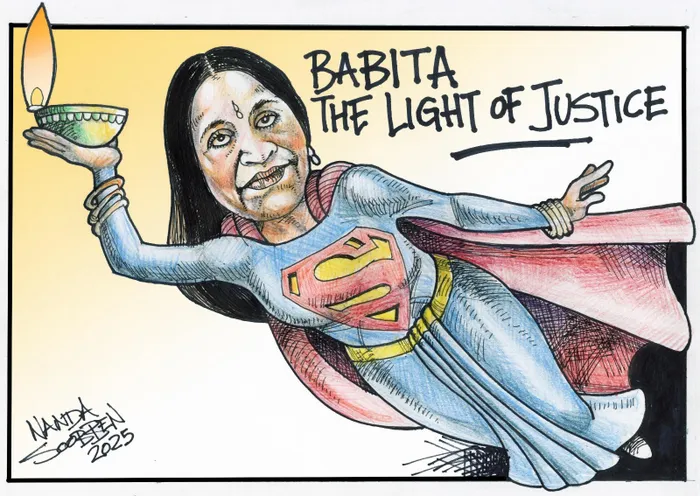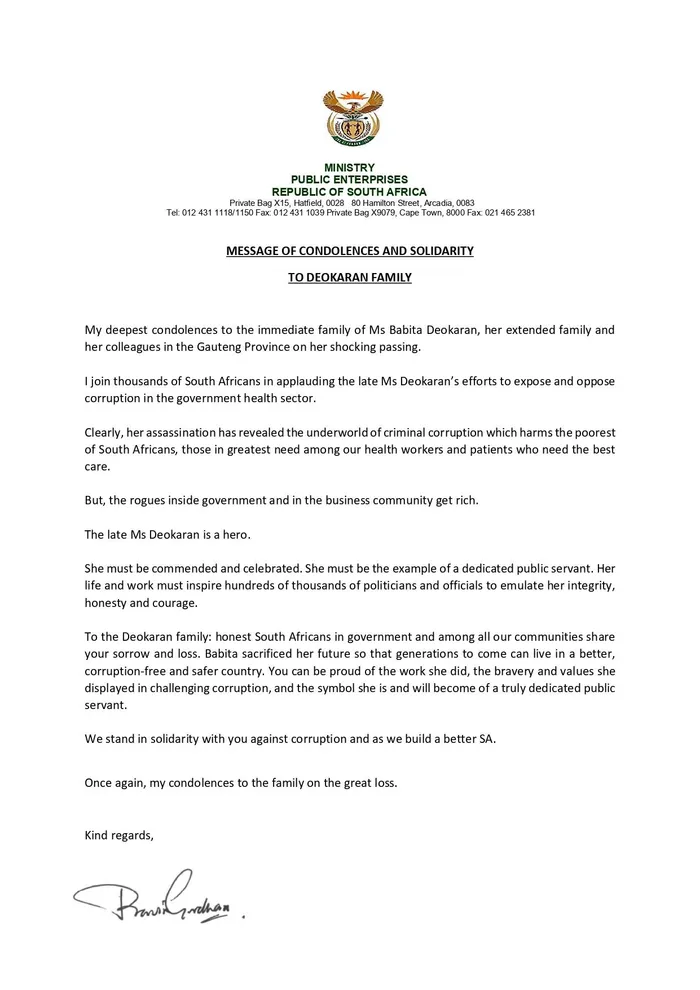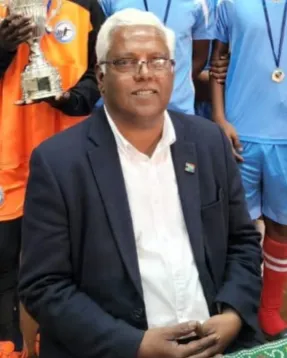
Babita Deokaran has become symbolic of a greater struggle to build the society we all want, says the writer.
Image: Nanda Soobben
I ATTENDED the funeral of Babita Deokaran with an all consuming pit in the stomach. How does one offer support and condolences in such circumstances? I drew strength from Babita’s example of a South African bravely committed to doing the right thing. It also helped that I carried with me a message of condolence and support from the now late Pravin Gordhan.
As many of us are want to do in moments of crisis, I had called Gordhan on learning of Babita’s death. He immediately understood the gravity of the situation and agreed to send a message of support. That message, in its entirety, is published alongside. It captures the essence of the national mood which prevails till today.
“Babita Deokaran is a national hero. She must be commended and celebrated. She must be the example of a dedicated public servant.’’
We hope that the family draws great strength from Gordhan’s message.

The letter by Pravin Gordhan.
Image: Supplied
2021 was a dreadful year. We were in the middle of Covid-19. We were still reeling from the July 2021 unrest when Babita was killed. Later we endured devastating floods. We can only imagine the despair of the family in such circumstances. But dedicated South Africans have persevered – against the odds. Despite deliberate obstruction.
Tribute must be paid to the courage of the family and Babita’s brother Rakesh in particular, to the media, civil society organiSations such as the Active Citizens Movement and the Ahmed Kathrada Foundation and many others.
Babita was a senior civil servant who took her job seriously. She represents the essence of what is meant by the capable state – people who have skills, understand their jobs and apply themselves with dedication and integrity. But she was also a caring family and community member. POST readers will be touched by the observation that on her fridge door “photos of joyful occasions, religious icons and Hindu deities had pride of place”.
I think that Babita would be the first to say that we must not let the many others who suffered the same fate become just statistics.
The cases of Sbu Sibiya (late ANC Ethekweni Regional Secretary), Grishen Bujram (Dundee community activist), Wandile Mkhize (Port Shepstone activist and leader) and Sbu Sithole (Richmond Municipal Manager) immediately come to mind. The list is long. Those cases must be followed up. Their stories too must be told. We are hopeful that the significant coverage, exposures, arrests and prosecutions (many would say too limited) are having an impact on the psyche of the public service as a whole.
That good people are inspired to be alert and enforce the substantial provisions of our legal framework to ensure good governance. And that those who are tempted to do wrong are deterred because there will be consequences. At the same time we must acknowledge that the fight against organised crime and corruption is complex and requires a response that is equally if not more organised and sophisticated.
There is important work being done to build a more effective national institutional and operational capacity. Comparative studies are also important. Countries like India and Mexico have many lessons to share. Even established democracies have had to build anti corruption capacity over time.
Koogan Pillay, an anti corruption activist, is working with Judge Richard Goldstone towards an International Corruption Court. There are many civil society and academic institutions adding to what can be a compelling cumulative impact. Yet it is at the local level that we can be most effective where matters are not remote or abstract. When water systems are sabotaged so that a “tanker mafia can benefit” local people must respond. If political parties are not doing their work, activists must arm communities with information and education.
Worker unions, especially municipal workers, must take a stand. Those workers come from the very communities that are being deprived. Those workers are best placed to know the infrastructure and possible sources of sabotage. They are the ones who know the few who unlawfully exploit overtime. There are also some deeper societal issues to examine. Poverty is real.
When iZinkabi (hitmen) can be secured with such ease and regularity we need to ask why? In many respects our province has been characterised as the belly of the beast. We have to confront this. We are a violent province. We also need to have a much better, deeper engagement with the taxi industry. It cannot be that such a massive industry, which is also an amazing representation of black entrepreneurship, does not make its rightful contribution to this discussion.
I would argue that at the heart of this is prevailing levels of inequality and economic transformation which are not sustainable. We certainly cannot have a vulgarised version of economic transformation – a version that is false because it does not build capacity and is a short hop to criminality. To defeat this we have to show a more meaningful and credible pathway to reducing inequality, economic participation and a new moral high ground.
Are we prepared to make sacrifices on this road ?There are those that argue that having regard to South Africa’s contradictions, corruption is a secondary issue. I do not agree. We cannot relegate it in that way. It is an antagonistic contradiction because it threatens the very possibility of the society we are trying to build.
Babita Deokaran has become symbolic of a greater struggle to build the society we all want. Let her memory inspire all of us to make our contribution – to have the personal integrity to resist corruption in whatever form. It starts with each of us.

Ravi Pillay
Image: Supplied
Ravi Pillay is an ANC activist and former KZN MEC for Finance.
** The views expressed do not necessarily reflect the views of IOL or Independent Media.
Related Topics: